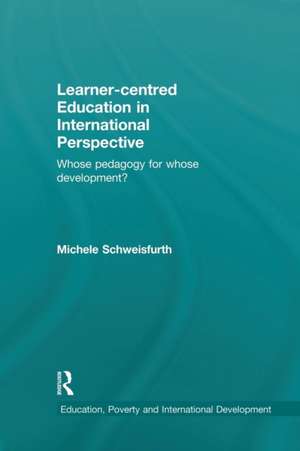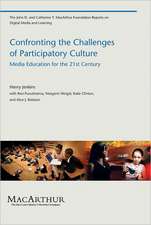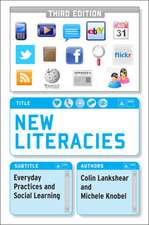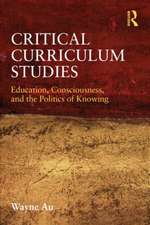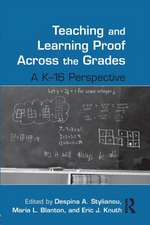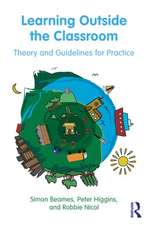Learner-centred Education in International Perspective: Whose pedagogy for whose development?: Education, Poverty and International Development
Autor Michele Schweisfurthen Limba Engleză Paperback – 9 iun 2015
Learner-centred education (LCE) is a travelling policy, widely promoted by international agencies and national governments. Arguments in favour of this pedagogical tradition refer to theories and evidence from cognitive psychology, claiming that all learners can benefit equally from its judicious use. Beyond the benefits to the individual however, lie a set of assumptions about learner-centred education as a foundation for the building of democratic citizens and societies, suitable for economies of the future. These promises have been questioned by critics who doubt that it is appropriate in all cultural and resource contexts, and there is considerable evidence in the global South of perennial problems of implementation.
In the light of these debates, is LCE still a good development ‘bet’? This book provides an authoritative and balanced investigation of these issues, exploring the contextual factors from global movements to local resourcing realities which have fuelled it as a discourse and affected its practice. In the light of the theoretical underpinnings and research evidence, the book addresses pressing questions: to what extent is learner-centred education a sound choice for policy and practice in developing countries? And if it is a sound choice, under which conditions is it a viable one?
The book is divided into three key parts:
- Learner-centred Education as a Global Phenomenon
- Learner-centred Education in Lower and Middle-income Countries
- Lessons and Resolutions
This book provides a much-needed fresh analysis of the concept and practice of LCE. It will be valuable reading for academics and post-graduates with a focus on comparative and international education, along with policy-makers in developing countries and development agencies.
| Toate formatele și edițiile | Preț | Express |
|---|---|---|
| Paperback (1) | 448.32 lei 6-8 săpt. | |
| Taylor & Francis – 9 iun 2015 | 448.32 lei 6-8 săpt. | |
| Hardback (1) | 1053.95 lei 6-8 săpt. | |
| Taylor & Francis – 7 mar 2013 | 1053.95 lei 6-8 săpt. |
Preț: 448.32 lei
Nou
Puncte Express: 672
Preț estimativ în valută:
85.78€ • 89.81$ • 70.98£
85.78€ • 89.81$ • 70.98£
Carte tipărită la comandă
Livrare economică 05-19 aprilie
Preluare comenzi: 021 569.72.76
Specificații
ISBN-13: 9781138929319
ISBN-10: 113892931X
Pagini: 184
Dimensiuni: 156 x 234 mm
Greutate: 0.28 kg
Ediția:1
Editura: Taylor & Francis
Colecția Routledge
Seria Education, Poverty and International Development
Locul publicării:Oxford, United Kingdom
ISBN-10: 113892931X
Pagini: 184
Dimensiuni: 156 x 234 mm
Greutate: 0.28 kg
Ediția:1
Editura: Taylor & Francis
Colecția Routledge
Seria Education, Poverty and International Development
Locul publicării:Oxford, United Kingdom
Public țintă
PostgraduateCuprins
1. Introduction Part I: Learner-centred Education as a Global Phenomenon 2. Learner-centred Education: Definitions and Provenance 3. Three Justificatory Narratives: Cognition, Emancipation and Preparation 4. Contexts for Learner-centred Education: Global, National and Local Part II: Learner-centred Education in Lower and Middle-income Countries 5. Learner-centred Education as a Promising but Problematic Policy in the Global South 6. The Gambia: The Intersection of the Global and the Local in a Small Developing Country 7. Moving Towards Learner-centred Education: China’s Multiple Paradoxes 8. Russia - Shifting and Resilient Narratives on the ‘Educated Person’ 9. South Africa’s Emancipatory Policy Discourses and Classroom Realities 10. Mobile Students and New Learner-centred Pedagogies Part III: Lessons and Resolutions 11. Ten Key Lessons from Theory, Evidence and Cases 12. Towards a Contextualised Learner-centred Pedagogical Nexus
Notă biografică
Michele Schweisfurth is Chair in Comparative and International Education at the School of Education, University of Glasgow. She is also the editor of the journal Comparative Education.
Descriere
Explores debates around learner-centred education (or child-centred education) as a strategy for developing teachers’ classroom practice and asks whether a ‘Western’ construct is appropriate for application in all societies and classrooms.
